What is a Desktop Zen Garden?
Stressed at work? Stressed at home? Escape from the never-ending stream of incessent noises and thoughts that bombard your daily life. If you’re open to Eastern meditation, maintaining a personal zen garden is a great way to find your inner piece. Keep reading to find out why you should have one in your home or office and where you can find a truly authentic Japanese desktop zen garden!
Desktop Zen garden kits are designed to recreate the dry landscape gardens of Japanese Zen Buddhism on a small scale for enjoyment at your home or office. Zen gardens use rocks and gravel or sand to recreate the essence of nature. Swirling patterns in the sand represent water, while rock formations become mountains or islands. Sometimes the gardens simply encourage meditation on the meaning of life. For example, Kyoto’s famous Ryoanji Zen garden consists of 15 rocks amid a white sandy space. By focusing on the space rather than the rocks, one can begin to understand the Buddhist ideal of emptiness and appreciate life’s beauty. While you may not be able to fly to Kyoto, you can get some of the same benefits—by having a Zen garden of your own right on your tabletop.
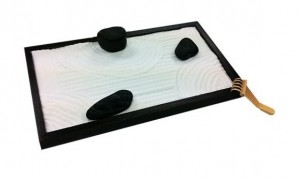
5 Reasons Everyone Should Have Their Own Desktop Zen Garden
Relieve Stress
One of the most important benefits of a miniature Zen garden is stress relief. By methodically arranging the stones and combing the sand, you can begin to relax. Focusing on the repetitive physical movements quiets your mind and enables you to truly experience the present moment, rather than worrying about the past or the future. Escape the stress of your busy everyday life with your Zen garden. You can even keep one at your desktop at work for when you need a break. You don’t need to worry about giving it sunlight or water, so maintenance won’t become another stress in your life. There is no right or wrong way to make your garden; you can achieve the benefits of stress relief just by mindfully tending it.
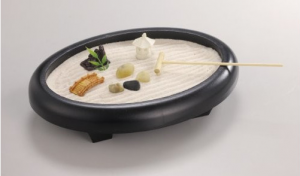
Practice Meditation
Meditating on a Zen garden can help you gain a wider perspective and see beyond what is in front of you. You can choose specific concepts to meditate on, like the Zen ideas of impermanence, the absence of self, or dualism. Perhaps you want to keep a couple quotes from Buddhist scriptures near your garden to meditate on. You could also contemplate a Zen Buddhist riddle, called a “koan.” Or just practice mindful breathing and try to empty your mind of conscious thoughts. Don’t fight with any thoughts that do arise, just recognize them and let them pass by effortlessly like clouds in a sky or a leaf on a river. Eventually your mind with quiet itself on its own.
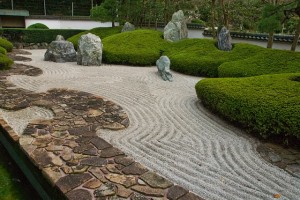
Develop a Sense of Beauty
Working with a desktop Zen garden can also help you develop a sense for aesthetics. Zen gardens are based on concepts of beauty that can be applied to your life, your home, and your creative projects. The first basic concept is Kanso, or simplicity. Another concept is Fukinsei, asymmetry or irregularity. There is beauty in things that are uneven or off center. The famous “Zen circle,” or enso, is often painted as an incomplete or imperfect circle to symbolize that imperfection is a part of life. However, there can still be a sense of balance in the asymmetry. Another important concept is Yugen, which can be translated in many ways including “a subtle grace,” “hidden beauty,” and “mysterious profundity.” As you work on your garden, you will start to understand these concepts and recognize them in the world around you.

Enhance Creative Flow
You can also use your Zen garden to stimulate your creativity, or to practice seeing things from many points of view. Placing it on your tabletop may even help you to find a new perspective or solve a problem plaguing you at work. Research has shown that meditation promotes “divergent thinking,” and important type of thinking where many new ideas are generated. The mindfulness you practice in your garden can also help you filter out unnecessary thoughts during creative activities.

Cultivate Discipline
Miniature or not, working with a Zen garden and practicing meditation can help improve your focus and patience. A study by neuroscientists showed that after just 11 hours, people who practiced meditation had actual changes in the part of the brain involved in focus and self-control. People who practice meditation also stay on task longer. One study showed that meditation can improve attention and concentration significantly on standardized tests after just a couple of weeks of practice. It has also shown to have an effect on fighting addictions by increasing mindfulness. Meditation has even been proven to lower blood pressure and improve your immune system when practiced regularly.
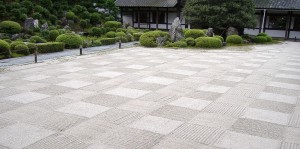
Using the Zen Garden Kit
A desktop Zen garden kit includes objects such as a wooden tray, sand, polished stones or rocks, and a wooden rake. Try to find a quiet space to work on your garden. You can even put on some relaxing nature sounds or just enjoy the rare quietness and stillness. First you’ll need to pour the sand into the tray. Then you can begin placing the stones into various arrangements, or simply begin raking as you please. Rake the sand in straight lines, swirls and ripples, or zig-zags. Create deep lines or shallow lines. Embrace the beauty of asymmetry. Pile the sand into mountains, rivers, and valleys. Don’t worry about making mistakes. Just take your time and enjoy the sensation of creating your own dry landscapes. When you are finished, you can leave it to enjoy as is for days. Or, you can start over and create a whole new landscape – embrace the Buddhist ideas of impermanence and nonattachment. When you are finished, don’t rush back to work or what you were previously doing. Take some breaths and refocus your mind. You are now ready to face whatever comes your way.
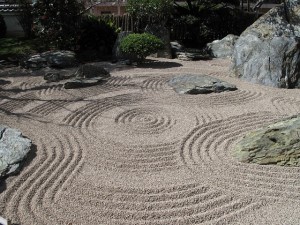
After you’ve had time to reflect on the benefits of owning a Zen garden, you can contemplate which serene vista might fit the mood in your home or office by visiting FROMJAPAN’s Zen garden page.



